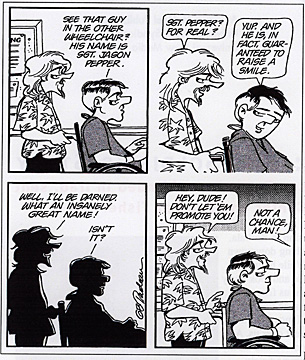
Trudeau’s book supports
soldiers in time of need
We have a peculiar relationship with the characters in daily comic strips. We interact with them more often and more regularly than we do our own relations -- although it's all one-way, no matter how hard you project -- and although they are nothing more than ink, paper, words and ideas, they have a certain vitality that makes them come alive as characters.
That is, if they're well written. The drawing is secondary. The writing is what makes a strip great, and "Doonesbury" is one of the great strips. It's been with us a third of a century, and creator Garry Trudeau keeps pushing the envelope, blurring the lines between the orderly four-panel existence of his little world and the big, messy world of perceived reality. What's the difference, really, between viewing the world through a TV news camera and the scratches of Trudeau's pen? A matter of degree.
Still, it's jarring when "reality" intrudes on the presumed ideological purity of the daily gag strip. (For instance, when Liz was assaulted by her co-worker in "For Better or for Worse" a couple of weeks ago, it was beyond creepy.)
Trudeau, however, has been mining hubris for decades, tweaking the rich, powerful and stupid, particularly those in the nation's capital. Because of this, "Doonesbury" has been criticized as a "liberal" strip, even though Trudeau's Clinton was as grotesque as his current Bush. He's an equal-opportunity social critic, more of a Mark Twain or Will Rogers than an opportunistic screed like Bruce Tinsley's "Mallard Fillmore," which exists only to snipe and sneer.
(Twain, after all, is the guy who noted that a real patriot supports his country all the time, and his government when it deserves it.)
![]()

At the time, some readers used to Trudeau's daring commented that for the first time, B.D.'s head was visible after decades being kept inside a football and Army helmet. But right-wing retros reacted in horror. The sanctity of the comics page had been compromised by reality! Fox commentator Bill O'Reilly frothed that Trudeau was "using someone's personal tragedy to advance a political agenda."
Agenda? The overwhelming impression from reading these comic strips is that when our soldiers get hurt, their support system is manned by caring professionals who are doing the best they can. In a time when the Bush administration and a conservative Congress is demanding more of our soldiers while simultaneously cutting veterans' health care -- Walter Reed Army Medical Center, the setting of much of this book, is currently on the chopping block -- it seems more like reporting than ranting.
"Whether you think we belong in Iraq or not," Trudeau said last year, "we can't tune it out; we have to remain mindful of the terrible losses that individual soldiers are suffering in our name."
TRUDEAU HAS always been respectful of the military (one of his first non-"Doonesbury" books was the odd pictorial history "Hitler Moves East"). During the war in Vietnam, "Doonesbury" was a regular feature in the military newspaper Stars and Stripes. A decade ago the Pentagon whipped up a touring show of Trudeau's Gulf War strips for troops still stationed in the region. Trudeau was also invited to postwar Kuwait for a medal of commendation.
Those who complain about him are mistaking unsettling content for political bias.
"The Long Road Home," however, was created in the new reality of declining congressional support for our disabled veterans. The book was cobbled together as a fund-raising tool for Fisher House, a charity that allows military families to live on the premises of rehabilitation hospitals. The program needs the money for the enormous increase in maimed soldiers coming from Iraq and Afghanistan, because it certainly isn't coming from the nation's legislature.
Trudeau spent quite a bit of time researching B.D.'s story line, actually visiting veterans' hospitals and Fisher Houses. At one he met a blinded soldier actually named Sgt. Pepper and, impressed by the soldier's courage, said he'd do something for him. A few weeks later, Pepper was immortalized in the daily strip. The line between cartoon and reality blurred again, to the dismay of those who don't want readers to think for themselves nor to be aware of the tremendous cost of freedom.
I can't imagine a timelier book than "The Long Road Home" nor one so timeless. Trudeau's work here deserves an award -- and our veterans deserve even more than medals.
E-mail to Features Desk
[News] [Business] [Features] [Sports] [Editorial] [Do It Electric!]
[Classified Ads] [Search] [Subscribe] [Info] [Letter to Editor]
[Feedback]
